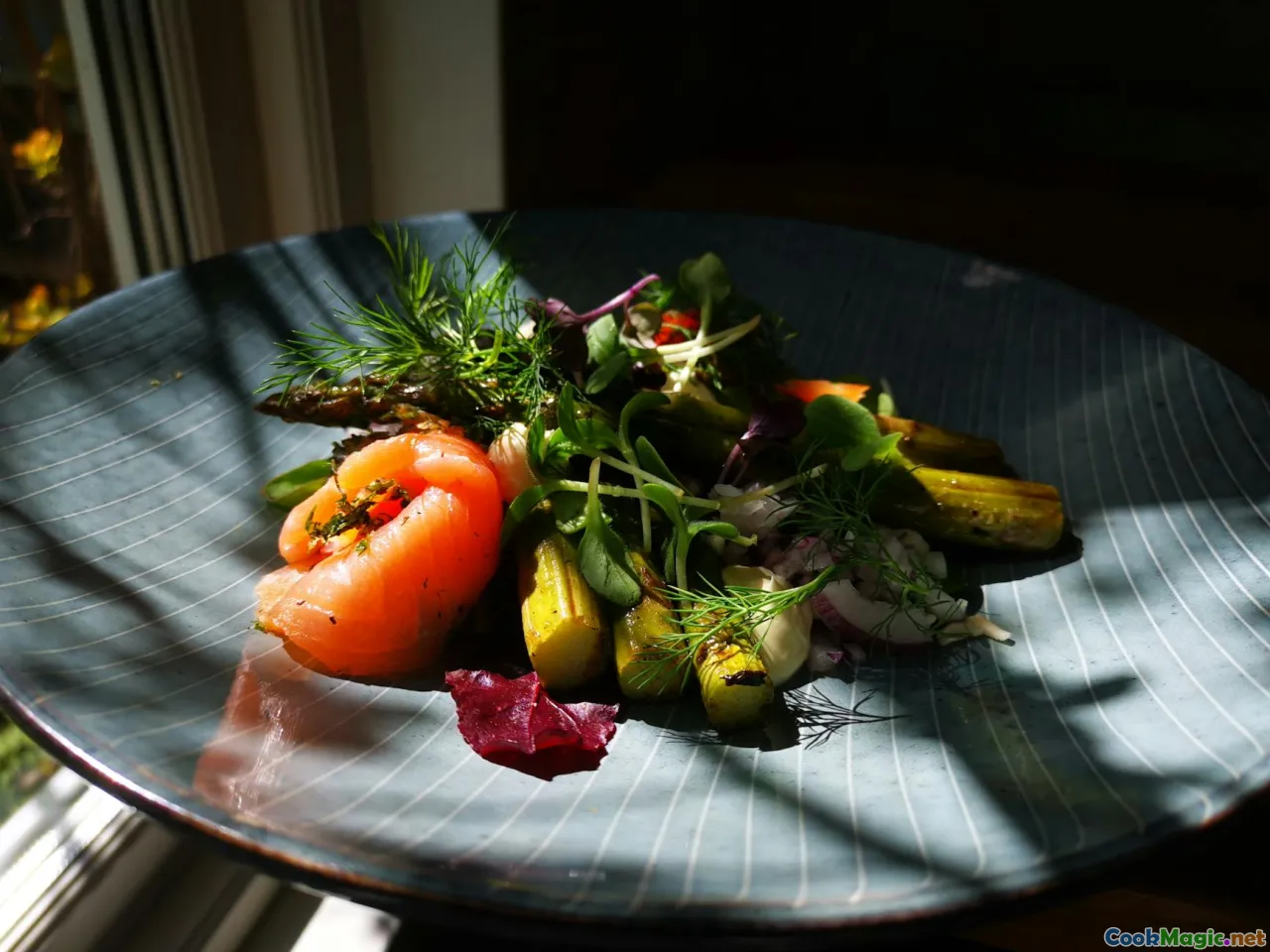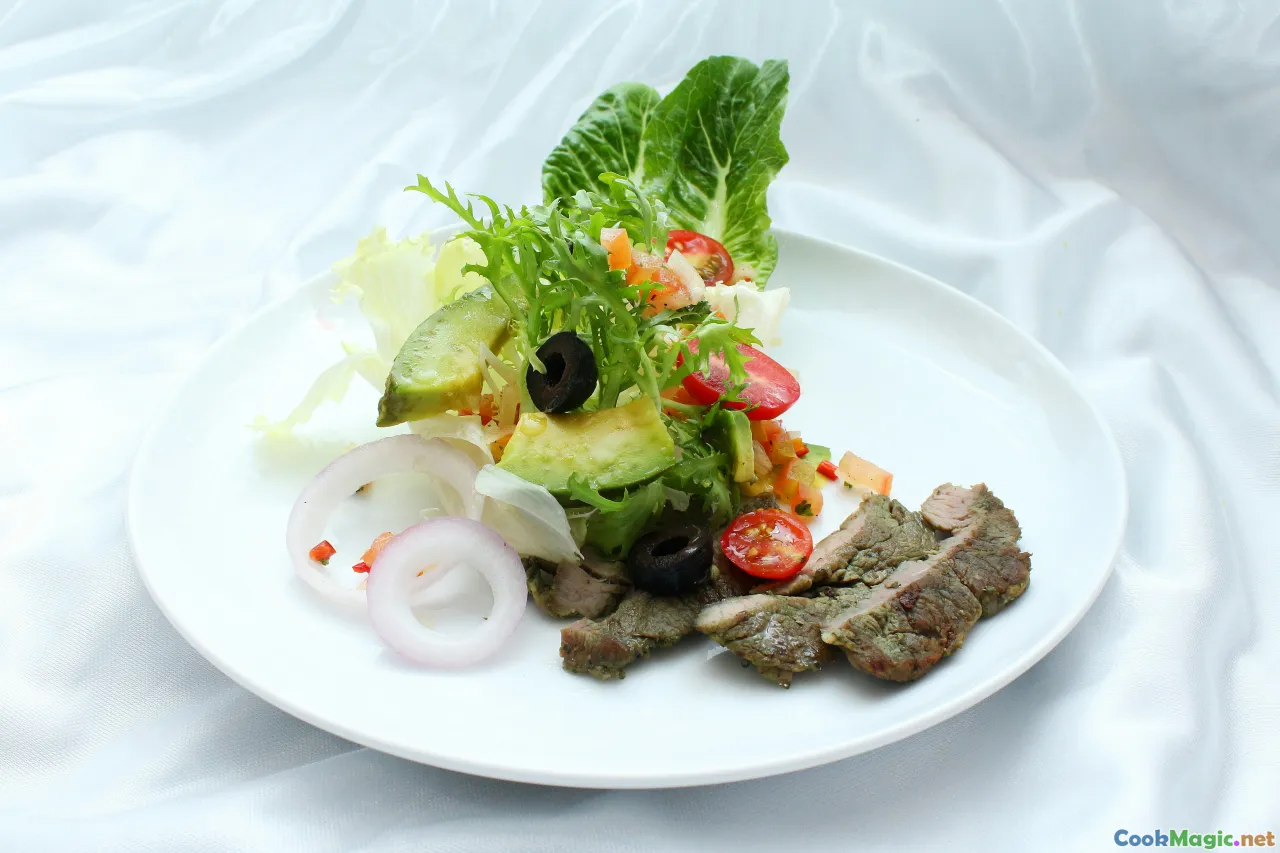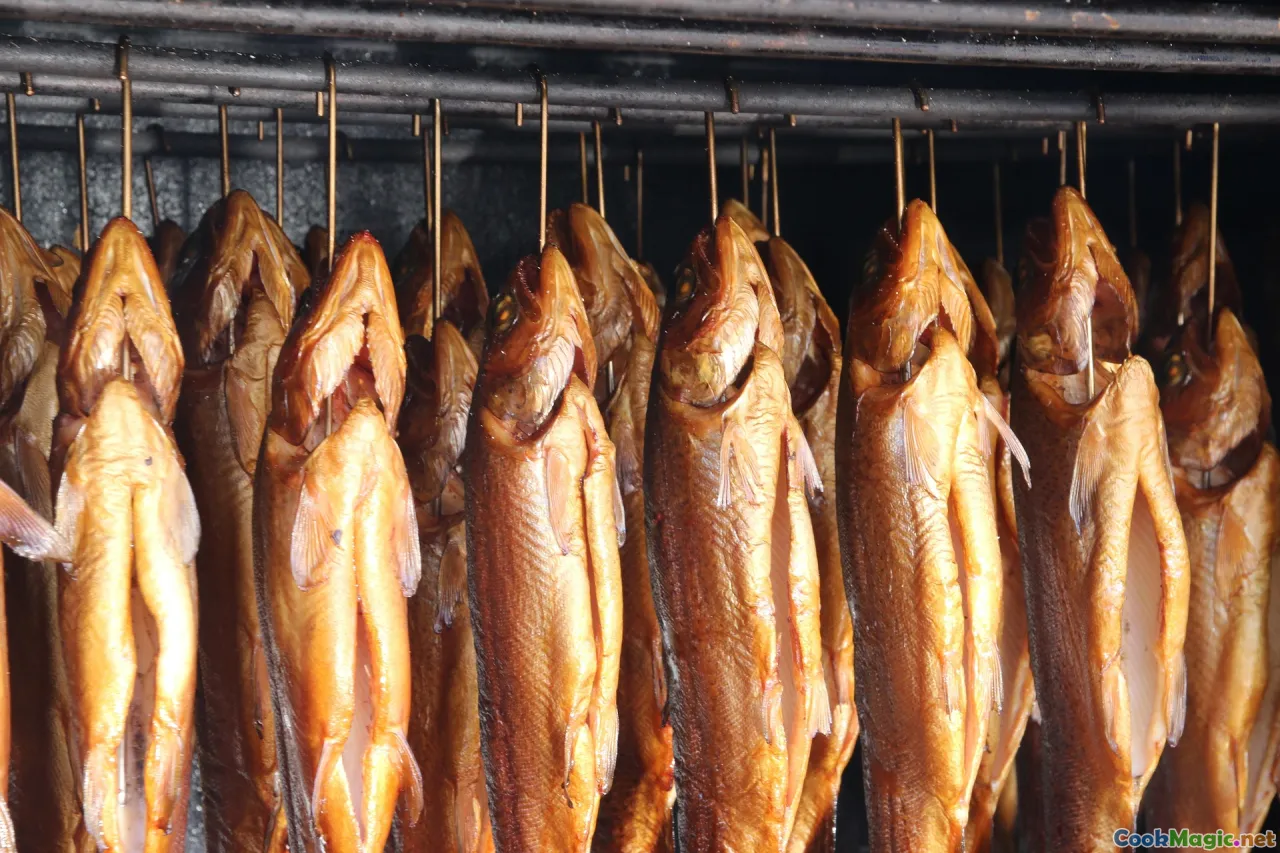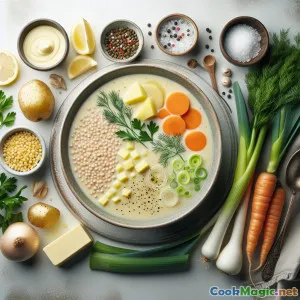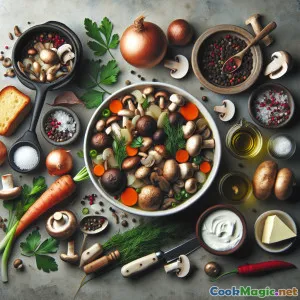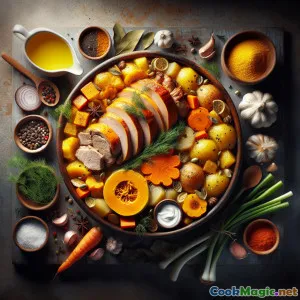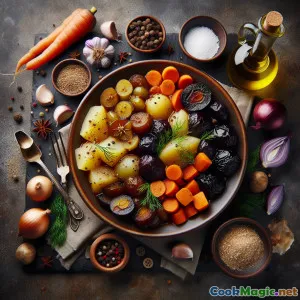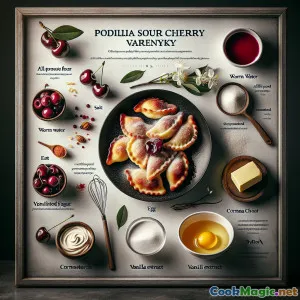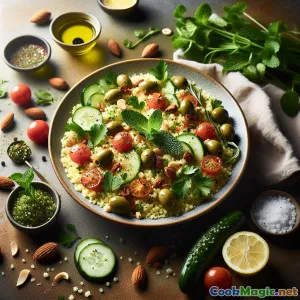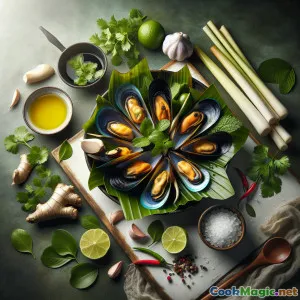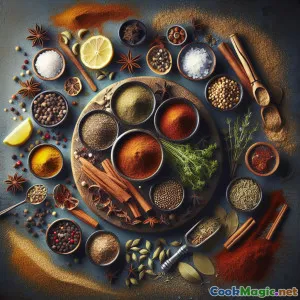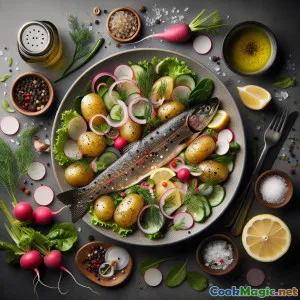
Salada de Truta Defumada Transcarpática com Endro e Picles
(Transcarpathian Smoked Trout Salad with Dill & Pickle)
(0 Avaliações)0
477
setembro 05, 2025
Reportar um problema
Ingredientes
-
180 grams Filé de truta defumada
(Skin removed; can use hot- or cold-smoked trout.)
-
150 grams Batatas baby
(Yukon Gold or new potatoes for best texture; halved.)
-
5 pieces Cornichons
(Or 2 medium pickled cucumbers, thinly sliced.)
-
3 pieces Rabanetes
(Thinly sliced for crispness and color.)
-
2 cups Verduras mistas
(Arugula, frisée, or local greens preferred.)
-
2 tablespoons Endro fresco
(Finely chopped, plus extra sprigs for garnish.)
-
1/4 small Cebola roxa
(Very thinly sliced (or use spring onion).)
-
1.5 tablespoons Suco de limão
(Espremido na hora para o melhor sabor.)
-
1.5 tablespoons óleo de girassol
(Or use extra-virgin olive oil if preferred.)
-
1 teaspoon Mostarda de grão inteiro
(Adds tang and texture.)
-
1/2 teaspoon Sal marinho
(A gosto.)
-
1/4 teaspoon Pimenta-do-reino preta ralada
(Moído na hora)
(Skin removed; can use hot- or cold-smoked trout.)
(Yukon Gold or new potatoes for best texture; halved.)
(Or 2 medium pickled cucumbers, thinly sliced.)
(Thinly sliced for crispness and color.)
(Arugula, frisée, or local greens preferred.)
(Finely chopped, plus extra sprigs for garnish.)
(Very thinly sliced (or use spring onion).)
(Espremido na hora para o melhor sabor.)
(Or use extra-virgin olive oil if preferred.)
(Adds tang and texture.)
(A gosto.)
(Moído na hora)
Nutrição
- Porções: 2
- Tamanho da Porção: 1 prato (250g)
- Calories: 370 kcal
- Carbohydrates: 36 g
- Protein: 19 g
- Fat: 17 g
- Fiber: 6 g
- Sugar: 4 g
- Sodium: 840 mg
- Cholesterol: 40 mg
- Calcium: 110 mg
- Iron: 2.1 mg
Instruções
-
1 - Cook and cool the potatoes:
Place halved baby potatoes in a saucepan; cover with water and a pinch of salt. Bring to a boil and simmer until fork-tender (about 10–12 min). Drain and let cool.
-
2 - Prepare trout and vegetables:
Flake the smoked trout into bite-sized pieces. Thinly slice radishes, cornichons, and red onion. Rough-chop dill.
-
3 - Make the Dressing:
In a small bowl, whisk together lemon juice, sunflower oil, mustard (if using), salt, and pepper until emulsified.
-
4 - Assemble the Salad:
In a large bowl, gently toss the cooled potatoes, trout, cornichons, radishes, red onion, and greens with the dressing. Add chopped dill and fold through without breaking up fish.
-
5 - Plate and Garnish:
Divide the salad between plates. Top with extra dill and a grind of pepper. Serve immediately, preferably slightly cool or at room temperature.
Place halved baby potatoes in a saucepan; cover with water and a pinch of salt. Bring to a boil and simmer until fork-tender (about 10–12 min). Drain and let cool.
Flake the smoked trout into bite-sized pieces. Thinly slice radishes, cornichons, and red onion. Rough-chop dill.
In a small bowl, whisk together lemon juice, sunflower oil, mustard (if using), salt, and pepper until emulsified.
In a large bowl, gently toss the cooled potatoes, trout, cornichons, radishes, red onion, and greens with the dressing. Add chopped dill and fold through without breaking up fish.
Divide the salad between plates. Top with extra dill and a grind of pepper. Serve immediately, preferably slightly cool or at room temperature.
Mais sobre: Salada de Truta Defumada Transcarpática com Endro e Picles
Transcarpathian Smoked Trout Salad: A Tradition of Freshness
Transcarpathia, the southwestern region of Ukraine shrouded by the veiled mystery of the Carpathian mountains, boasts a culinary history shaped by its unique landscape and multicultural influences. This vibrant smoked trout salad captures the freshness, resourcefulness, and traditional foodways of a region where wild rivers teem with trout and foraged herbs color every table.
History & Significance
Historically, mountain streams and cool springs of the Carpathians have made trout an everyday catch for locals. Smoking fish—whether over fireplace embers or fragrant orchard woods—provided preservation for winter months, but equally served to infuse beloved, celebratory dishes with woodsy depth. The salad appearing here is not a codified restaurant recipe but more a distillation of household lunches. It feels humble yet festive—brought forth like patchwork from fresh local bounty and traditional preservation methods.
The addition of baby potatoes (an homage to hearty village fare), bracing cornichon or pickle (shared across Hungary, Slovakia and Ukraine), and a cheerful heap of finely chopped dill speaks to the cross-border flavors Berlin, Bratislava, Uzhhorod, and beyond. Throughout, trout—pink and silky, just assertive enough—remains the centerpiece, flanked and brightened by accoutrements designed to both celebrate and soften the smoke’s edge.
Cooking Notes & Tips
-
Trout: Both hot-smoked and cold-smoked fillet varieties work—the former will yield bolder, flakier bites, while the latter is more delicate and soft. Farm-sourced or wild-caught and locally smoked trout from Carpathian streams, if available, is an unmatched delicacy.
-
Greens: The suggested leafy base is open to regional improvisation—try tart sorrel, wild rocket (arugula), delicate lamb's lettuce, or toothsome young spinach. In spring, foraged wild garlic or even nettle leaves would each add-is authentic zing.
-
Herbs: Dill is the triumphant herbal note and shouldn’t be omitted, but extra parsley or soft tarragon is also suitable.
-
Potatoes: For texture contrast, ensure you do not overcook the potatoes; a bit of firmness provides structure among the creamy fish and crunchy vegetables.
-
Dressing: Sunflower oil—a Ukrainian classic—imbues a golden, nutty aroma distinct from olive oil’s grassiness. Whole-grain mustard adds tang, tying together the ensemble’s smokiness and vinegary crunch.
-
Substitutions: Horseradish can swipe boldly in place of mustard, while thick kefir or yogurt (for a creamy variation) brings a slight tang popular along Polonynian meadows.
Cultural & Unique Aspects
Transcarpathian salads have a knack for balancing richness with brightness. The smoked element pounds in a sense of occasion—often appearing on holidays or at feasts for honored guests. Still, these salads remain plain enough for quick summer lunches, a testament to the region's deep respect for ingredients that arise with the morning dew or mountain fog.
This dish, in the broader context, underlines how Ukrainian cuisine bridges European culinary lanes, combining Central European preservation with Slavic zest.
Final Thoughts & Serving Suggestions
Serve this salad chilled yet not icy, surfaced elegantly on rough country pottery. Pair with rye bread, fresh farmer’s cheese, or if desired, a young white or dry sparkling wine from the region’s emerging vineyards. Let each bite transport you to the misted hills where the recipe’s soul was shaped.
And perhaps most of all: embrace the adaptability—add crisped bacon, sharp radish mustard, or even scatter wildflowers, according to season and memory. This salad is a joyous fragment of mountain summers, echoing the songs of streams and shepherd fires, ready to be savored far from the Carpathians with as much gratitude—and dill—as you please.

